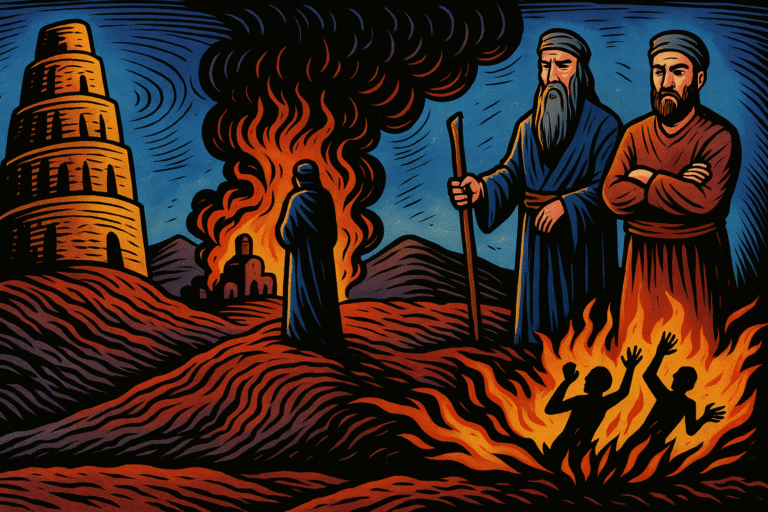The Real Meaning of Chevlei Mashiach

How Machloket Not for the Sake of Heaven Serves a Higher Purpose
In last few articles from The Shoemaker Report we have taken the time to explain teachings from the Zohar ha-Kadosh and from the Vilna Gaon that state unequivocally that one of the worst sins we could become involved in, chas v'shalom, is the sin of participating in, promoting, or spreading gossip to sow discord or controversy regarding our talmidei chachamim. In fact, it is such a terrible sin that it actually impedes the revelation of Mashiach.
We will now examine a few sources that explain more about what we should expect in the years and months leading up to the revelation of Mashiach.
It is written in Ketuvot 112b: אָמַר רַבִּי זֵירָא אָמַר רַבִּי יִרְמְיָה בַּר אַבָּא: דּוֹר שֶׁבֶּן דָּוִד בָּא קָטֵיגוֹרְיָא בְּתַלְמִידֵי חֲכָמִים. כִּי אַמְרִיתַהּ קַמֵּיהּ דִּשְׁמוּאֵל אֲמַר צֵירוּף אַחַר צֵירוּף שֶׁנֶּאֱמַר ״וְעוֹד בָּהּ עֲשִׂירִיָּה וְשָׁבָה וְהָיְתָה לְבָעֵר״. תָּנֵי רַב יוֹסֵף: בָּזוֹזֵי וּבָזוֹזֵי דְבָזוֹזִי (R' Zeira said in the name of R' Yirmeyah bar Abba, 'The generation in which [Mashiach] ben David comes will experience kateigoria against the talmidei chachamim.' When I said this in front of Shmuel, he said, 'Tzeiruf after tzeiruf', as it is said [Yeshayah 6:13], 'And yet a tenth will remain in it, and that will be purged through fire'. Rav Yosef taught, 'bazozei and bazozei of bazozi).
Rashi explains the meaning of kateigoria: הרבה מסטינים ומלמדים חובה יעמדו עליהם (Many critics and prosecutors will stand against them). The denunciation and vilification of Torah scholars that is described here doesn't seem to be a rare phenomenon, something that happens only occasionally, but rather a widespread problem. Rashi also tells us the meaning of tzeiruf after tzeiruf [literally, refinement after refinement]: גזירות על גזירות (decrees upon decrees). In other words, they will have to pass through one terrible disaster after another in order to be purified or refined, much like a precious metal such as gold has to pass through fire in order for it to be purified of its impurities. And what is the main method of this purification? Rav Yosef tells us that it is through bazozei and bazozei of bazozi [literally, plunderers and plunderers of plunderers]. The Ben Yehoyada has a lengthy explanation of this phrase, but he summarizes it with these words: כי עושים עלילות בשקר על היהודי (For they make false schemes against the Jew).
Regarding the revelation of Mashiach, it is taught (Shabbat 118a): אָמַר רַבִּי שִׁמְעוֹן בֶּן פַּזִּי אָמַר רַבִּי יְהוֹשֻׁעַ בֶּן לֵוִי מִשּׁוּם בַּר קַפָּרָא: כָּל הַמְקַיֵּים שָׁלֹשׁ סְעוּדוֹת בְּשַׁבָּת נִיצּוֹל מִשָּׁלֹשׁ פּוּרְעָנִיּוֹת: מֵחֶבְלוֹ שֶׁל מָשִׁיחַ, וּמִדִּינָהּ שֶׁל גֵּיהִנָּם, וּמִמִּלְחֶמֶת גּוֹג וּמָגוֹג (R' Shimon ben Pazi said that R' Yehoshua ben Levi said in the name of Bar Kappara, Anyone who fulfills [the obligation to eat] three meals on Shabbat will be saved from three punishments: chevlei Mashiach, the judgment of Gehinnom, and the war of Gog and Magog). We often hear about this expression chevlei Mashiach [labor pains, or more literally, 'ropes' of Mashiach], but what does it exactly mean? Rashi explains the phrase by referring to the very Gemara in Ketuvot we just brought down, i.e. קטיגוריא בתלמידי חכמים (accusations against the Torah sages). The hallmark characteristic of chevlei Mashiach is davka the persecutions and accusations against our talmidei chachamim. And that's why those who are 'champions of controversy', i.e. the ba'alei machloket that we learned about in the previous articles, impede the revelation of Mashiach. They impede him because their accusations and criticisms literally cause him to be tied up in ropes or chains, either physical ones or spiritual ones.
Of course, related to the ba'alei machloket are heretics. What exactly is a heretic [אֶפִּיקוֹרוֹס, epikoros]? Normally, we tend to think of an epikoros as someone who denies the existence of G-d or who denies the validity of the Torah as given by Hashem to Moshe Rabbeinu. These are true definitions, but this is not the way the Gemara defines it. First of all, the Mishnah (Sanhedrin 90a) states that an epikoros does not have a share in Olam ha-Ba. Now, that's pretty serious. Later on, the Gemara explains the actual meaning of the term (Sanhedrin 99b): רב ור' חנינא אמרי תרוייהו זה המבזה ת"ח רבי יוחנן ור' יהושע בן לוי אמרי זה המבזה חבירו בפני ת"ח (Rav and R' Chanina both say that it refers to someone who denigrates [alternative translations: scorns, shames, disgraces] a talmid chacham; R' Yochanan and R' Yehoshua ben Levi say that it refers to someone who denigrates his peer in the presence of a talmid chacham). Now, if you think about this a little bit, you'll realize that there is no real disagreement here. R' Yochanan and R' Yehoshua ben Levi do not disagree with Rav and R' Chanina. Rather, they are adding to their explanation. Not only is an epikoros someone who denigrates a talmid chacham, but he is even someone who denigrates another individual in the presence of a talmid chacham. How come this must be true? It is true because someone who denigrates another individual in the presence of a talmid chacham obviously does not hold the talmid chacham in very high regard, for if he truly holds him in high esteem, he would never have the audacity or the chutzpah to speak against another individual in his presence.
So what might lead an individual to feel justified in disgracing a talmid chacham? First and foremost, we don't normally go around speaking against talmidei chachamim. We are, after all, sons of Avraham, Yitzchak and Ya'akov. And it's written as halachah in the Mishneh Torah (Talmud Torah 6:11): עָוֹן גָּדוֹל הוּא לְבַזּוֹת אֶת הַחֲכָמִים אוֹ לִשְׂנוֹאתָן; לֹא חָרְבָה יְרוּשָׁלַיִם עַד שֶׁבִּזּוּ בָּהּ תַּלְמִידֵי חֲכָמִים (It is a great sin to disgrace the chachamim or to hate them; Yerushalayim was not destroyed until they disgraced the talmidei chachamim [Sanhedrin 119b]). This is codified in the Shulchan Aruch as well (Yoreh Deah 243): עון גדול הוא לבזות תלמידי חכמים או לשנאותן וכל המבזה את החכמים אין לו חלק לעולם הבא (It is a great sin to disgrace talmidei chachamim or to hate them, and anyone who disgraces the chachamim have no portion in Olam ha-Ba). More sources could be brought down, but this will suffice for now.
Knowing all this, why would anyone do such a disgraceful thing? There must be a reason.
Maybe he heard from another individual that such and such talmid chacham committed a terrible sin. Maybe some people even testified that they witnessed such and such talmid chacham commit a terrible sin. Or maybe he just read it in the news and assumed that it must be true. After all, the media are well known for their integrity, honesty and accuracy, right? But that can't be the reason either because Chazal teach the following (Berachot 19a): תָּנָא דְּבֵי רַבִּי יִשְׁמָעֵאל: אִם רָאִיתָ תַּלְמִיד חָכָם שֶׁעָבַר עֲבֵירָה בַּלַּיְלָה אַל תְּהַרְהֵר אַחֲרָיו בַּיּוֹם שֶׁמָּא עָשָׂה תְּשׁוּבָה. שֶׁמָּא סָלְקָא דַעְתָּךְ? אֶלָּא וַדַּאי עָשָׂה תְּשׁוּבָה (It was taught in the yeshiva of R' Yishmael: If you saw a talmid chacham that committed a transgression during the night, do not have thoughts against him during the day. Perhaps he did teshuvah. You think [only] 'perhaps'? For sure he [already] did teshuvah).
So we have to admit it. We're stumped. Considering all of these halachot and teachings of Chazal, how could it be that anyone could convince himself that it's acceptable to disparage a talmid chacham?
The sad truth is that it is similar to how some behaved toward Moshe Rabbeinu. When Korach and his 250 sages came together and spoke out against Moshe Rabbeinu, it is written that Moshe fell upon his face (Bamidbar 16:4). Wondering why he did such a thing, the Gemara records the following (Sanhedrin 110a): מה שמועה שמע אמר רבי שמואל בר נחמני א"ר יונתן שחשדוהו מאשת איש שנאמר (תהלים קו, טז) ויקנאו למשה במחנה א"ר שמואל בר יצחק מלמד שכל אחד ואחד קנא את אשתו ממשה שנאמר (שמות לג, ז) ומשה יקח את האהל ונטה לו מחוץ למחנה (What report did he hear [that caused him to react in such a dramatic way]? R' Shmuel bar Nachmani said that R' Yochanan said that they suspected him of committing adultery with a married woman, as it says [Tehillim 106:16], 'And they were jealous of Moshe in the camp'. R' Shmuel bar Yitzchak said that this teaches that everyone issued a warning to his wife, as it says [Shemot 33:7], 'And Moshe took his tent and pitched it outside the camp').
Can you imagine such a thing? Everyone suspected the Tzaddik of the generation of committing adultery! Hard to believe, but it's true. And this seems to be the answer for which we have been searching. Since everyone suspected that Moshe was an adulterer, they were able to justify that it was permissible to speak openly about it.
And Moshe was not unique in being accused of sins he never committed. Toward the end of David ha-Melech's life, David told Shlomo to deal with Shimi ben Gera because he had cursed him with an explicit [נִמְרֶצֶת, nimretzet] curse (Melachim Aleph 2:8-9). What was the nature of this curse? Rav Acha ben Yaakov explained that the word is an acronym for five separate curses (Shabbat 105a): נוֹאֵף הוּא מוֹאָבִי הוּא רוֹצֵחַ הוּא צוֹרֵר הוּא תּוֹעֵבָה הוּא (He's an adulterer [no’ef], a non-Jew [Moavi], a murderer [rotzeach], an enemy of the Jewish people [tzorer] and a pervert [to’eivah]). Of course, none of these accusations were true, but facts did not stop people from accusing him of them anyway.
So the question is, How come some of our most righteous and holy people become targets for some of the worst imaginable accusations? As we have explained in many articles before, people tend to see faults (real and even imaginary ones) in others that are a reflection of their own faults. In modern lingo, it's called projection, a psychological phenomenon in which feelings toward oneself are directed or displaced toward others. It is a defense mechanism that shields people from accepting and acknowledging unpleasant truths about themselves. We're not justifying the practice; we're just explaining it. The good side of this issue is that the more we learn to be truthful about ourselves, the less we will tend to project our flaws (however minor they may be) on others. In short, the reason people tend to accuse our greatest tzaddikim and talmidei chachamim of the worst imaginable moral crimes is because there is at least a seed of that crime within the people themselves that they haven't yet acknowledged and for which they have not yet done teshuvah.
In some cases, the accusations are even worse than these. The sages from the beit midrash of R' Shila taught a frightening truth (Sanhedrin 97a): כל מי שסר מרע משתולל על הבריות (Anyone who turns from evil will be considered a madman [alternatively, crazy person] by the people). Rashi says about this statement: כל העולם אומרין עליו שוטה הוא (The world says about him that he's an idiot). And it would seem reasonable to conclude that the more one turns from evil, the greater the tendency to call such a person an idiot. This should help us to understand a very puzzling statement in an ancient, mystical teaching from the Tanna and Kohen Gadol R' Yishmael (Heichalot Rabbati 35:5): באותו שעה חוזרין ישראל לדעת אחרת ומבזין למשיח ואומרים אוי לנו שתעינו אחר משוגע זה אמר להם הקדוש ברוך הוא משוגע אתם קורין אותו עכשיו תראו את האור שלו (At that time, Yisrael will return to an another opinion and will disgrace Mashiach, and they will say, 'Woe to us that we strayed after this crazy person.' Ha-Kadosh baruch Hu will say to them, 'You call him crazy? Now I will show you his light').
This is why David ha-Melech thanked and praised Hashem for the disgrace and the insults that Mashiach himself will suffer (Tehillim 89:51-53): זְכֹר אֲדֹנָ־י חֶרְפַּת עֲבָדֶיךָ שְׂאֵתִי בְחֵיקִי כׇּל־רַבִּים עַמִּים׃ אֲשֶׁר חֵרְפוּ אוֹיְבֶיךָ יְיָ אֲשֶׁר חֵרְפוּ עִקְּבוֹת מְשִׁיחֶךָ׃ בָּרוּךְ יְיָ לְעוֹלָם אָמֵן וְאָמֵן (Adon-ai, remember the disgrace of Your servants, [insults] from many peoples that I bore in my lap, which Your enemies, Hashem, have disgraced; that they have disgraced the heels [alternatively, 'footsteps'] of Your Mashiach. Blessed is Hashem for ever! Amen and amen!). It seems like a strange way to end the mizmor, to bless Hashem for all the insults and disgraces that His servants, including the Mashiach, have borne throughout history. But that's the point. It was davka through all those insults and disgrace that the one destined to become Mashiach is able to become Mashiach! And this is in accordance with what the Midrash teaches (Tehillim 18): כך כשיבוא משיח במהרה בימינו אין אומרים שירה עד שיתחרף המשיח שנאמר (תהלים פט נב) אשר חרפו עקבות משיחך (Likewise, when Mashiach comes, speedily in our days, we will not sing song until the Mashiach is disgraced, as it says [Tehillim 89:52]: 'that they have disgraced the heels of Your Mashiach').
So the question is, What kind of a Mashiach are we expecting? Maybe we should keep our options open, because we might be surprised.







There have been tragically instances of pedophilia among certain rabbis . How one reacts to this should have been mentioned. Too often they have been covered up which your piece implies should be done.
You're absolutely right about the disgusting behaviour of various trusted rabbis and manhigim, and the subsequent and continual coverups. And many of these individuals are still in our communities and it's assur (!) to call them out and officially sanction them to protect the community's children. So as a result, many people don't even know that they're living next door. Disgusting.
Our point was on the opposite case, where rabbis and respected leaders haven't done what they're accused of and people jump on the condemnation bandwagon.
Maybe in the future, we'll devote more ink to the pedophilia problem. Good point.
"When Elokim sees that a certain tzaddik has the power to draw people to the service of Elokim, He causes enemies to rise against him, because that will enable him to draw people closer to Elokim. For when a tzaddik does not have enemies, he cannot draw people to Elokim, just as it will be in the days of Mashiach, when the world will be at peace, and converts will not be accepted."
— Rebbe Nachman of Breslov, writing in the Sefer HaMiddot, Chapter entitled "Tzaddik", Second Book, #17